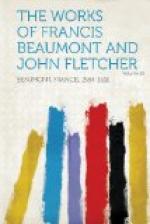yet the effect it selfe from both whole drawes; So
though you were thus twisted and combind As two
bodies, to have but one faire minde Yet if we praise
you rightly, we must say Both joyn’d, and
both did wholly make the Play, For that you could
write singly, we may guesse By the divided peeces
which the Presse Hath severally sent forth; nor
were gone so (Like some our Moderne Authors) made
to go On meerely by the helpe of the other, who
To purchase fame do come forth one of two; Nor
wrote you so, that ones part was to lick The other
into shape, nor did one stick The others cold inventions
with such wit, As served like spice, to make them
quick and fit; Nor out of mutuall want, or emptinesse,
Did you conspire to go still twins to th’ Presse:
But what thus joy tied you wrote, might have come
forth As good from each, and stored with the same
worth That thus united them, you did joyne sense,
In you ’twas League, in others impotence;
And the Presse which both thus amongst us sends,
Sends us one Poet in a faire of friends._
Jasper Maine.
Upon the report of the printing of the Dramaticall Poems of Master John Fletcher, collected before, and now set forth in one Volume.
Though when all Fletcher writ, and the entire
Man was indulged unto that sacred fire,
His thoughts, and his thoughts dresse, appeared both such,
That ’twas his happy fault to do too much;
Who therefore wisely did submit each birth
To knowing Beaumont e’re it did come forth,
Working againe untill he said ’twas fit,
And made him the sobriety of his wit;
Though thus he call’d his Judge into his fame,
And for that aid allow’d him halfe the name,
’Tis knowne, that sometimes he did stand alone,
That both the Spunge and Pencill were his owne;
That himselfe judged himselfe, could singly do,
And was at last Beaumont and Fletcher too;
Else we had lost his Shepherdesse, a piece
Even and smooth, spun from a finer fleece,
Where softnesse raignes, where passions passions greet,
Gentle and high, as floods of Balsam meet.
Where dressed in white expressions, sit bright Loves,
Drawne, like their fairest Queen, by milkie Doves;
A piece, which Johnson in a rapture bid
Come up a glorifi’d Worke, and so it did.
Else had his Muse set with his friend; the Stage
Had missed those Poems, which yet take the Age;
The world had lost those rich exemplars, where
Art, Language, Wit, sit ruling in one Spheare,
Where the fresh matters soare above old Theames,
As Prophets Raptures do above our Dreames;
Where in a worthy scorne he dares refuse
All other Gods, and makes the thing his Muse;
Where he calls passions up, and layes them so,
As spirits, aw’d by him to come and go;
Where the free Author did what e’re he would,
And nothing will’d, but what a Poet should.




